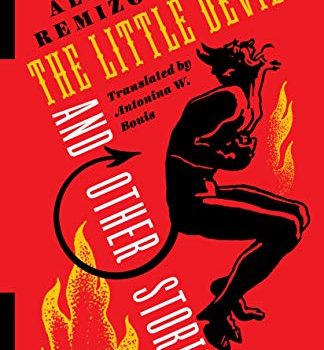Ian Mond Reviews The Little Devil and Other Stories by Aleksey Remizov
 The Little Devil and Other Stories, Aleksey Remizov (Columbia University Press 978-0-23118-381-9, $16.95, 336pp) April 2021.
The Little Devil and Other Stories, Aleksey Remizov (Columbia University Press 978-0-23118-381-9, $16.95, 336pp) April 2021.
As fate, coincidence, or the publishing gods would have it, in the same month that New York Review Books is releasing a collection of supernatural stories by Teffi, Columbia University Press is publishing a collection of supernatural stories by Teffi’s compatriot and contemporary: Aleksey Remizov. As with Teffi, I was unaware of Remizov’s work. However, the brief notes that preface each of the 13 stories that make up The Little Devil and Other Stories – sadly, my review copy was missing the introduction – sketch a fascinating, tantalising portrait of a political radical who spent eight years in a Siberian exile where he discovered a love of Russian folklore. Although initially a Marxist, Remizov’s loathing of revolutionary violence meant he did not support the October Revolution, and thus, like Teffi, he left Russia and emigrated to Paris. Unlike Teffi, Remizov’s fiction didn’t enjoy the same popularity (much of the fiction he wrote was never published). However, he did gain some notoriety as the first Russian modernist to catch the eye of the Parisian literary elite, including James Joyce.
“Bebka”, the opening story of The Little Devil, doesn’t entirely prepare us for what’s to come. It’s a short, melancholy piece that provides a glimpse into Remizov’s life in Siberia, particularly the author’s relationship with the titular Bebka, the son of the couple he stayed with during his exile. We get a better appreciation of Remizov’s story-telling nous with “Petushock The Cockerel”. Set in Moscow in 1905, young Petka and his God-fearing Grandmother live a cramped, impoverished existence in the basement of a church, their one possession a very old turkey hen. Despite this hardscrabble existence, the imaginative Petka gets up to all manner of shenanigans, including a delightful bit of magical realism involving a turkey giving birth to a chick. This whimsical fairytale, though, is savagely undercut by a shocking climax, a stark reminder of the violent revolution swirling around Petka and his Grandmother. “The Sacrifice”, also set in 1905, chronicles the tragedy that befalls the Borodin Estate where each of the children, bar one, die horribly. Central to this story and its grisly ending is Pyotr Nikolaevich, the “deathly pale eccentric” head of the family, with a fetish for corpses. “The more repulsive the dead faces, the stronger the sense of corruption, the more attractive he found the corpse.”
The title story, “The Little Devil”, draws heavily on Remizov’s interest in folklore and superstition. The piece focuses on the Divilin family’s devotion to the old ways, and like many of Remizov’s tales, features a male character on the verge of insanity, this time an exterminator who leads the Divlins in their secret religious services. “Princess Mymra” is an almost (but not quite) light-hearted story that sees a young man named Atya fall in love with the tenant in the family’s apartment, unaware she’s a prostitute. While very different in style and tone, the moment Atya realises the truth reminded me of L.P. Hartley’s The Go-Between.
Remizov turns his attention to ghosts and necromancy in “The Kind Guard”, where a group of drunk and arrogant medical students look to resurrect their dead professor by having one of the students remove the cross from the man’s grave. While the treatment of women in this story is awful – the female roommate of the main character has her less attractive head replaced with something prettier – Remizov’s take on spirit possession feels fresh despite being conceived and written eight decades ago. In “The Venerable Lis”, one of my favourite stories in the collection, a monk named Lisii finds refuge at the remote Tikhonov monastery. However, his vulpine features and his “excessive gentleness and rule-following” lead the suspicious elder monks to believe that Lisii is not human but rather “born out of frog slime.” Lisii is a terrific character, and if there’s ever a story where Remizov seems to be having fun, it’s this one.
Two of the final three stories in the collection (“About Pyotr and Fevronia of Muron” and “Grigory and Ksenia”) are fascinating reworkings of classic Russian fairytales. The third story, “Savva Grudtsyn” – easily the longest piece in the book – is a fairy-tale version of historical events, specifically the election of the first Romanov Tsar and the war between Russia and Poland in 1613. This sprawling, anarchic, utterly madcap tale sees the titular protagonist, the son of a wealthy merchant, move to the city of Oryol to expand his father’s business. There he has an affair and falls in love with the wife of the most powerful man in the city, makes a deal, signed in blood, with a horse-trader (who is clearly a demon) and murders his lover in a fit of jealousy. And that’s just the first third of the story. There’s a point toward the end of the tale, where Savva, now a soldier, holds off the Polish army with his bare hands. Consistent with the other stories in this collection, I was in awe of Remizov’s boundless imagination, his elaborate set-pieces, and his dazzling imagery.
The good news is that The Little Devil and Other Stories isn’t our only sample of Remizov’s work. On finishing the collection, I immediately purchased his short novel, Sisters of the Cross, also published by Columbia University Press, which, going by the blurb, has all the strange and unnerving hallmarks of Remizov’s short fiction.
This review and more like it in the June 2021 issue of Locus.
 While you are here, please take a moment to support Locus with a one-time or recurring donation. We rely on reader donations to keep the magazine and site going, and would like to keep the site paywall free, but WE NEED YOUR FINANCIAL SUPPORT to continue quality coverage of the science fiction and fantasy field.
While you are here, please take a moment to support Locus with a one-time or recurring donation. We rely on reader donations to keep the magazine and site going, and would like to keep the site paywall free, but WE NEED YOUR FINANCIAL SUPPORT to continue quality coverage of the science fiction and fantasy field.
©Locus Magazine. Copyrighted material may not be republished without permission of LSFF.







